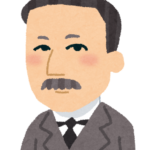
心理学入門書「ヒルガードの心理学」の章末要約(chapter summary)を日本語訳します。大学受験に向けて英語を勉強している方、心理学の勉強をしてみたい方に向けて、やさしい日本語訳を目指します。このブログは筆者の翻訳、要約であり市販されている本の転載ではありません。市販品はこちらです。
【原文】
The basic unit of the nervous system is specialized type of called a neuron. Projecting from the cell body of a neuron are short branches called dendrites and a slender tubelike extension called the axon. Stimulation of the dendrites and cell body leads to a neural impulse that travels down the length of the axon. Sensory neurons transmits signals from sense organs to the brain and spinal cord; motor neurons transmit signals from the brain and spinal cord to muscles and glands. a nerve is bundle of elongated axons belonging to hundreds or neurons.
【日本語】
神経系の基本単位はニューロンと呼ばれる特殊なタイプです。ニューロンの細胞体から突き出ているのは、樹状突起と呼ばれる短い枝と、軸索と呼ばれる細い管状の延長です。樹状突起と細胞体の刺激は、軸索の長さを伝わる神経インパルス(神経繊維に沿って進む放電)につながります。感覚ニューロンは、感覚器官から脳と脊髄に信号を伝達します。運動ニューロンは、脳と脊髄から筋肉と腺に信号を送信します。神経は、数百またはニューロンに属する細長い軸索の束です。
【原文】
A stimulus moves along a neuron as an electrochemical impulse that travels from the dendrites to the end of the axon. The traveling impulse, or action potential, is caused by depolarization, an electrochemical process in which the voltage across cell mechanisms is charged at successive points along the neuron.
【日本語訳】
刺激は、樹状突起から軸索の端まで移動する電気化学的インパルスとしてニューロンに沿って移動します。移動するインパルス、すなわち活動電位は、脱分極によって引き起こされる。脱分極とは、細胞のメカニズムにかかる電圧が、神経細胞に沿った連続した地点で充電される電気化学的プロセスである。













